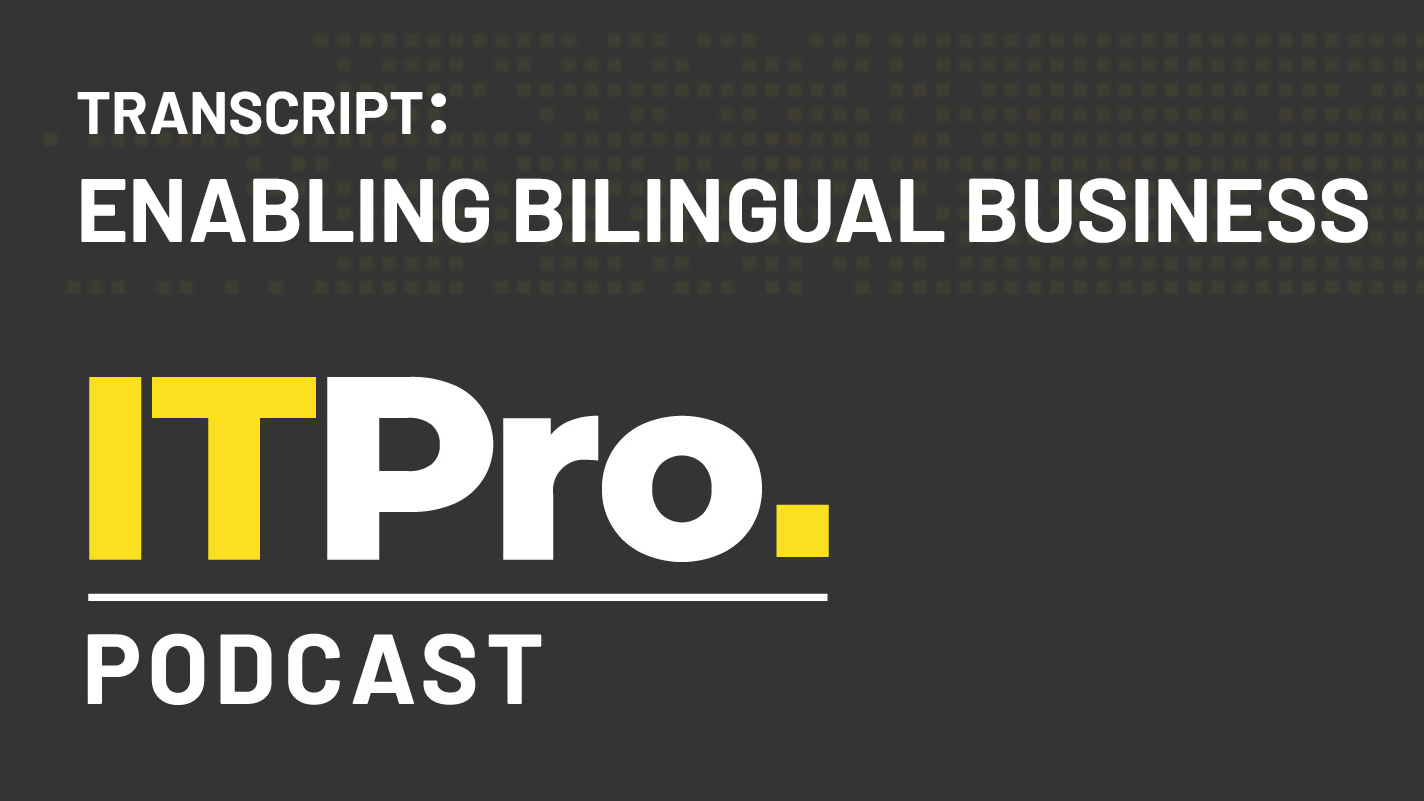
This automatically-generated transcript is taken from the IT Pro Podcast episode ‘Enabling bilingual business’. We apologise for any errors.
Adam Shepherd
Hi, I'm Adam Shepherd.
Rory Bathgate
And I'm Rory Bathgate.
Adam
And you're listening to the IT Pro Podcast. But before we get into this week's episode, I've got some news that I'd like to share. And that is that this will be my last episode of the podcast. As of next week, I'll be leaving IT Pro for pastures new. But don't worry, I'll be leaving you in the capable hands of Rory, who will be manning the helm after I'm gone. And he'll be joined by our erstwhile co host Jane when she makes her triumphant return later this year.
Rory
Thanks, Adam. You will be greatly missed, but I know that you've got great things in store. And in the meantime, I'm excited to helm the podcast and look forward to the return of Jane.
Adam
Yeah, it's it's gonna be good to hear Jane back on the podcast when she gets back later in the year.
Rory
I know that longtime listeners will be happy to have Jane back as one of the co hosts.
Sign up today and you will receive a free copy of our Future Focus 2025 report - the leading guidance on AI, cybersecurity and other IT challenges as per 700+ senior executives
Adam
Now on to the main event of this week's podcast we are going to be looking at technology use in government. Governments around the world are incredibly reliant on technology, not just to increase their own operational efficiency in the same way that every organisation is, but also as a vehicle for delivering digital platforms and services to their citizens.
Rory
Making effective use of this technology can be a tough balancing act. But when done right, it can offer transformative results for both government employees and the general public. This week, we're joined by an IT leader who has been navigating the challenges of this task. Glyn Jones, Chief Digital Officer for the Welsh Government, Glyn, thanks for coming on the show.
Glyn Jones
Bore da. Mae'n fendith bod yma heddiw. Good morning. It's a pleasure to be here this morning.
Adam
It's a pleasure to have you. So Glyn, what role does technology play in delivering services to the people of Wales?
Glyn
Yeah, so we have set out our ambitions around using digital technology and digital services through our digital strategy for Wales, which was published back in March 2021. Now, we saw during the pandemic, how using technology and digital had become basically critical to providing services to people in Wales. So we wanted to capitalise on the momentum that we've seen during the pandemic, and set out an ambition for really transforming how citizens received public services in Wales. And to do that, by the use of digital ways of working and technology. The digital strategy really sets out a vision for world class public services to be delivered with the user at the centre of the design. And to really try and give the public the experience from public services that they get from their online shopping and their online banking. It's a big ambition, you know, we've got a long way to go. But what we've been able to do since we set out that digital strategy is really build some momentum, build some excitement around what we're doing in Wales. Under the strategy, we set up a new body called the Centre for digital public services, who were given the task to be leaders, to work with public authorities and central governments to understand digital and technology, to help them use digital and technology better in delivering those critical services to the people in Wales.
Rory
So as part of this move, you've recently been involved in a project with Microsoft, which allows organisations to use live human interpreters to translate between different languages during Teams meetings; could you expand a bit more on that project and how it fits into the wider strategy?
Glyn
Yeah, so this is a really important project for us, and our digital strategy. So Wales is a bilingual nation, about one in five people speak Welsh. In the last census, there was 560,000 people. And we've got an ambitious strategy around the use of Welsh language, we want to double the use of Welsh language on a daily basis by 2050. We also want to increase the number of Welsh speakers to a million by 2050. But we understand that as part of that, we need to make sure digital technology is supportive of those aims. As a bilingual nation, obviously, we want to be able to give people the opportunity to use Welsh wherever they want to and that means in official business with government, and also for our own staff to be able to work bilingually. Prior to the pandemic, we were all meeting face to face mostly. So you could deliver those bilingual meetings by having a physical translator or interpreter in the room and we'd all wear headsets, or those people who couldn't speak Welsh would wear headsets to make sure they got a bilingual feed into their ears. The pandemic hit. We all shifted to work from home. We all started using online video conferencing platforms. And, you know, the immediate question came, well, how do we make sure we continue to have bilingual ways of working? How do we make sure we allow citizens and our partners to engage with us in Welsh, and how do we meet the statutory standards we have in Wales, while whilst we're all working from home and working remotely. And that ranges from the internal meetings we would have within Welsh Government to meetings we would have with our partners and our stakeholders to meetings our ministers would have with people. And it's really important for us that we provide a provision for bilingual meetings, because not only do we need to do it, but it's the right thing to do, because meetings will become far better and more productive; people are able to engage in the language of choice. So when the pandemic hit, we were just going through the sort of transition as many people were, I think, into Teams, Teams became our sort of day to day core business. So our chief technology officer at the time, immediately said to Microsoft, right, Microsoft, how are we going to get on the roadmap for Teams, that we can provide bilingual meetings, and we've led this dialogue with Microsoft, I understand that we're the country that have been driving this the most. It's really an example of where we as a country want to support the global efforts to provide bilingual services working with those big companies to do so. So Microsoft picked us up, understood the requirements through through the regular dialogue between ourselves and our Welsh language technology colleagues, as well. And started showing us some wireframes, prototypes, and it was all looking good. They involved us in the test circle at quite an early stage, that was about Christmas last year. And through doing that, we were able to provide them with people like me, who are Welsh speakers, translators interpreters, other public sector bodies, who could work with Microsoft to be part of the development journey, and to help test the features and to improve and iterate to make sure that by the time the product landed, it was it was fit for purpose, and it would meet the requirements we all have. And happy to say that it's now in general availability, we've we've just had it released to our to our staff in the past week or so. So really excited about how this functionality can help us have conduct our business bilingually, conduct business bilingually with partner organisations, it is not just a thing for the public sector, private sector will also be able to use it. And it's also not just about the Welsh language. It's agnostic of language, it literally provides you with the opportunity to have multiple audio feeds in Teams. And I understand from Microsoft that they can handle up to 16 languages in a particular meeting.
Adam
Wow. I mean, this obviously unlocks a lot of potential for international business generally. In terms of the bilingual aspects, were there any other countries or territories that you took inspiration from in terms of their approach to leveraging technology to deliver bilingual services and experience? I mean, Canada is the obvious example that springs to my mind in terms of a country that operates bilingually by by default.
Glyn
Yes, my colleagues in the Welsh language division within Welsh Government, I think they've got quite a lot of good contacts across the world with those kinds of countries, particularly where, where there are countries with minority languages. So you're talking about areas such as the Basque region, and Catalonia. And so on. So what we hope to do through this is provide, in a sense, provide a driver for Microsoft to make a change, which will impact on others. And if they're doing the same as well, then that's great. My understanding is on this particular one, we were the we were the leaders, Microsoft told us we were the ones pushing it. But yeah, if you if you look at how the EU Parliament runs, or the United Nations, and you see there that those those proceedings happen, regardless of what language people want to speak. And we just need to be able to get that same sense within Wales, that regardless of what language you can speak, you can contribute to a meeting, and you don't need to worry about the technology. And I just think this is a real game changer now, and actually, despite us being over the past few years found it difficult to retain the sort of everyday use of Welsh that within within a corporate environment, you miss the corridor conversations you might have in Welsh, you will certainly have missed those formal meetings, which won't have happened so frequently through Welsh, we will actually come out of this with a set of technology, which will actually be a game changer for us and the rest of the world and being able to truly have bilingual meetings where you may be the only Welsh speaker in the room, but you can contribute in Welsh and colleagues around the around the table will be able to understand what you're saying and have that dialogue with you.
Rory
You're looking to break down these language barriers to the extent that in the long term when this system is working perfectly, you're barely thinking about the technology when when you're in the meeting itself.
Glyn
Yeah, absolutely. So this is, in a sense, providing what Teams, what the new functionality in Teams does now is provide you with an audio stream. So if there's an interpreter in the room, if you're a non Welsh speaker, you can, you can choose the audio feed you want to listen to. So as soon as I start speaking Welsh, my audio will dip and you will hear the interpreter talk in English. So that's fine, that's great. But that still requires an interpreter in the room to do the manual translation. And that's a really important step. But I see it very much as a stepping stone. So we've been doing a lot of work with Bangor University and other people around developing the language sets and the training data to improve the natural language processing and the artificial intelligence around this. So eventually, you will hopefully be able to have speech to text translation, so the subtitles will appear in whatever language you want them to do. And once you've got that, you can use the automated translation facility to translate to whatever, whatever language you want, which, which again, will then hopefully, you know, it may not be the case for every meeting, because for every for some formal meetings, you will certainly want that manual translation, but if it's just a meeting within the office, you know, some of the automated translation will certainly be good enough to help people, what we then need to do is get people to build the confidence in doing so. So as as a Welsh speaker, I know that if you're in a room with other English speakers, you've got to have the confidence to say no, I'm going to use Welsh, and you are going to have to use whatever tools there are to, to have that conversation with you. And I think there's a business change element to this. There's a communication and a cultural element to bilingual ways of working, which goes beyond the technology. And that's, that's in a sense, our next step, now that we have the technology, we really want to make those meetings as effective as possible. So for example, even even before this has launched this week, on on a Teams chat, we could already translate from Welsh to English in text through the automated Microsoft translate; not many people are using that, people still default to put in the Teams chat in English rather than Welsh. So how do we change the culture? How do we get people confident enough to be able to have bilingual meetings? How do we get the chair of a meeting to encourage that to happen? So it's very much as much of a behavioural and cultural thing as it is technology.
Adam
I was gonna say, I was quite surprised, given Microsoft's heavy investment in AI, that this system is leveraging human interpreters, rather than AI translation software for, for default, it seems like a kind of natural comfort zone for Microsoft particularly to to go straight for AI rather than the human element. So it's, it's sort of not surprising that that's the the end goal, if you like is to incorporate AI elements alongside human translators.
Glyn
Yeah, that's definitely the case. So now our requirement was for human interpretation. Because, you know, we know there's still a journey to go on artificial intelligence and getting it right. So it's really important for us to make sure we have that human element to this right now. And that will certainly be the way most meetings happen for the for the short term. The long term aim has to be to do that. And of course, a lot of that does depend on the training data and the maturity of the the algorithms they have available. Now working I think I said with Bangor University on this, they have, they have released a transcriber to produce automatic subtitles for Welsh videos. So it is happening, but we need to make sure the quality and so on is is right. When we fund those kinds of language technology developments, another thing we're clear about is that we expect the resources and data to be released under open licence. So that means the training data can be shared with other companies. And they can add Welsh into their services. So we're very keen that as in terms of public money, when we're investing into this, we're investing in open licences. We've been working with Amazon Web Services as well. They've released recently a dataset called MASSIVE in capital letters, which is natural language data. And you know, we were really pleased that they engaged with us. And actually, Welsh is one of the 51 languages that they've used in that dataset. So I think the more of those training datasets we get out there, the more natural language material and resources are out there openly, you know, the better this will get in the future.
Rory
And it's, as you said earlier, where with this public funding, with this open source goal always, the hope is that in the future, it could it could benefit multiple languages, multiple countries that are currently seeing this this language barrier impacting on public and private services.
Glyn
Yeah, Absolutely, absolutely, the more languages we use, the more interoperable we'll be and the more we can retain and promote those minority languages, to sustain those languages, but not only just to sustain them, as I said at the start in terms of the number of speakers, but actually the language is used, because a language that's thriving is a language that's living, I think, is how we say; I may, I may have reflected our policy aims slightly wrong here. But you get my gist; a language has to be living to be thriving, and you want to be able to use the language. And I'm sure many other countries are facing the same challenge of keeping the number of speakers but also making sure people have the ability to use them in an increasingly global world.
Adam
So Glyn, looking at the the technology side of this, what benefits have you seen from having this technology built directly into the Teams platform? For example, do you find that having it directly there has increased the effectiveness and the adoption of Teams and other digital services within your organization's?
Glyn
Yes, so I mean, as I said, it's just hit general availability. So in terms of the usage, we will now be putting out in terms of our organisation, guidance and material on how best to use it. But this is the important thing for us. So I, to be fair, Zoom have had a facility over the past two years, that's been really, really important for many organisations have been able to deliver some bilingual meetings, but Zoom didn't meet all of our requirements. And part of that was because we are a Microsoft house, we have Microsoft embedded in our day to day work. So all of our meetings are Teams, and therefore having it embedded into everyday, everyday working is really important, particularly for that behavioural change thing I mentioned, if we're going to add barriers for people to go off to another product, to be able to facilitate bilingual meetings, then those are going to be barriers that mean it doesn't happen so well. And if you think about the wider wraparound feeling of a meeting, the invitation, the chat, that has the for me, it's looking at as a whole sort of bilingual experience. And that can only be done for us and other public organisations by having it embedded into Teams, it obviously also then helps us interact with the other uses we all make of Teams around Teams channels and records management and so on. So having that really embedded into our work is is crucial to allow it to be natural and the norm within an organisation I think.
Adam
Cause I'd imagine, I'm not sure which way round this, this is more likely to work. But I would imagine that either having the services available in Welsh or with Welsh kind of support built in makes people more likely to use them? Or maybe it's the other way around that having having the Welsh support makes people more likely to use Welsh. Maybe both?
Glyn
Yeah, so I think the the important is you make it as frictionless as possible for somebody to use whatever language they want. So for example, if you're using a government website, and you're in your lead into a, an English website, it shouldn't be 10 clicks, then to try and find another, a Welsh or another language, it should be as seamless as possible. Ideally, you should have given that choice as soon as you land on the website, what language do you want to interact with the service in, that's what happens in cash points in Wales. So if you go to a cash point in Wales, if whenever you are getting cash out these days, which I think is increasingly rare, you get the option of choosing English or Welsh first, then you get, so you don't have to physically make a change. And as a Welsh speaker, you don't have to do anything extra to get the Welsh. And that's what we want bilingual services to be like, and if you make as frictionless as possible, you just encourage people to use them. And people will have the confidence that there is a good bilingual service here that I can feel confident that the Welsh version is going to be right. I'm not going to go five screens down and then just find an English version because hasn't been translated or nobody's really thought of the end to end process as a bilingual process. So yeah, very much, let's make it as easy as possible. And, you know, as I said, let's let's go get this technology to be the norm that they're offering Welsh as part of that offer, wherever you are, I mean, there is no reason some of the stuff couldn't couldn't be global. So, for example, I was just really pleased at some point in the past few years that I went to McDonald's in England, and they offered Welsh as a language for their online orderings screen. Why wouldn't you? Because they've they've put the effort to do that in Wales. So why would you not that then incorporate that into your sort of online... I'm doing the thing, sorry, not very good for radio. If you've put the effort to put the technology in, in Wales to provide the digital menu offering in Welsh, why wouldn't you then just use that in other parts of the UK? Right?
Adam
And that's the beauty of digital systems in particular, they're so highly extensible. You know, you can something like, you know, language support, for example, can be super easily lifted and shifted across, you know, across your ordering systems all over the world.
Glyn
Absolutely.
Rory
On that point of digital systems, and you mentioned government websites, I know that the Government Digital Service has announced a plan to shift towards one login for gov.UK, that kind of centralization of services. Is this centralization of services across government websites, does that tie in to this kind of frictionless system of translation? Is the end goal down the line a system where someone could log on to a government website, and through one system, be able to access everything without as you're saying, having to go down steps to have everything translated?
Glyn
Yeah, I think that's that's got to be the ambition. So the one login for government is a UK government project at the moment, but we're working closely with them, we're feeding into the thinking around that. And one of the one of the things we have been pushing on is because the UK government deliver services in Wales as well as well as Welsh Government do, you need to make sure that one login for government reflects the Bilingual Services and bilingual service designed from the start. So that's the sort of, in a sense, the outward facing bit of it, which is really important. But Rory, you're right, and actually the end goal here, so we have this concept in Wales that you should, that you should be able to give a language preference. And that's the preference. That's, that's the language you want to do business with that organisation in. Ideally, you know, if you've told governments, you want to want to work with them in Welsh, as you said Rory, that that should become the norm then for when you're accessing services, I think we've got a long way to go. But as I say, we're engaging with the one login for government and trying to work out what it means for services in Wales, but that has to be the ideal is that you, you, your default language is Welsh, and therefore you get offered their services in Welsh, we're also really keen for example, for that to happen within the Microsoft environment itself as well. So if you can establish yourself as a Welsh speaker through the Microsoft Active Directory, you get the the Welsh interface and everything else, by default. At the moment, you have to then sort of go extra and install it and so on. So I think that that's definitely got to be the aim.
Adam
Yeah. And that extends, presumably, to just the small but impactful user experience tweaks such as like, in Word, for example, having the Welsh spellcheck dictionary automatically downloaded and activated.
Glyn
Yeah, absolutely. And some of that does happen already. And a lot of that is because of the work we've done with Microsoft over the years to embed Welsh into some of their packs. And the, you know, as I said, the Welsh language interface for Windows was something that we worked at Microsoft with quite a few years ago now. And we're really pleased when it was launched, but yeah still, you've got to put the effort in to make it as frictionless as possible. And then it's ensuring the sort of big vendors are keeping up with when they're investing in new technology, that we don't have to go through this, again, that it's a default that Welsh is a language that those sort of services and technologies are offered in. And, and from our point of view, you know, we want to highlight to them that if they want to do business in Wales, they have to provide those, provide the technology options to support Bilingual Services, because that's what public authorities in Wales need to have.
Rory
So moving from the public to the private sector, because I know that you mentioned that maybe as an ambition in the future, the private sector can benefit from this as well, is the idea that alongside the Welsh tech sector, so companies operating from Wales, based within Wales, being able to benefit from this in house, you're also looking at a benefit for big tech, shall we say, being able to have a frictionless experience with Welsh customers, with Welsh businesses? So it's a kind of a win win in that in that regard?
Glyn
Yeah, absolutely. So obviously, the functionality in Teams now is is available to anyone who's subscribing to the normal Microsoft Teams package. So it will be provided under the normal general licence which is great so they don't have to invest extra in this functionality. So from that point of view, private sector will be able to benefit just as much as us. More generally, you know, in our digital strategy and our Welsh language technology action plan, we're really keen to promote businesses thriving in Wales in digital sectors. And the more they do that, obviously, they will benefit from providing services in Wales, people in Wales will benefit from those organisations. Working from Wales, having good digital capability in Wales. As you've sort of said, Rory, it'll also feed off each other and it's a win win. Those big vendors, I know they have have a customer base. And well, Welsh speakers are one of the customer bases, and my job and my colleagues in the Welsh language technology team. I'll name check Jeremy Evas and Gareth Morlais, who do fantastic work on this, our job is to make sure those vendors hear us and understand the requirements for Wales, and where there's a will for them to work with us, as we've shown with Amazon and Microsoft, now, we're here to work with them, you know, we we know that they'll need some support to understand requirements. And I think we've demonstrated how keen we are to to do that for the benefit of everyone.
Adam
Where there's a will there's a Wales, you might say. So looking at your own use of technology, then, how are you planning to expand on the use of digital tools within the Welsh Government in the future? You mentioned during the pandemic, you made a big shift over to teams to fuel that kind of more digitally transformed, kind of flexible, and more agile way of working? Are there any plans to kind of build on that with more or deeper use of these kinds of tools?
Glyn
Yeah, I mean, we will all have seen how we've just changed our ways of working in in two and a half years, and, you know, a number of massive benefits in terms of collaboration, and through using Teams channels, and other collaboration channels. Everybody working collectively, on particular projects. So we've had to do a lot of work over the past few months, obviously, on the Ukraine crisis, we're making really good uses of Teams channels there to work together and collaboratively and keep each other informed. One massive change we've seen is actually staff engagement with senior management, because instead of sort of, doing a tour of large government sites, and getting a few people come to a particular meeting room that would never house the five and a half thousand people working in Welsh government, we're now able to run live events, with our permanent secretary, ministers and senior managers talking directly to staff and we regularly have around half of our workforce logging into those things. And we see then from people survey results, the staff are feeling far more engaged than ever, they feel senior managers are far more visible than they ever were before. And they're just so easy to set up, aren't they? So, you know, so many benefits. So yeah, so the task I've been given is like, how do we how do we capitalise on that? How do we do better in the future? So we're trying to invest in a digital team to really look at some of our, you know, we're a central government department, we still have clunky ways of working, that's not a surprise. So we want to do better, we want to provide our staff with the kind of business processes and, and digital services that that we're trying to offer citizens out there that they get from their bank, as I said earlier, but that they should be getting within Welsh Government. So we want to really get to the bottom of where we see inefficiencies, where are we seeing the staff having to fill in five forms to do something, and to try and help automate, streamline that as much as possible. So yeah, so it's, it. It's just something that's part of our transformation plan for the for the next few years, and really excited. And actually, the feedback we get from staff is actually, you know, there's loads of things you could do, but actually focus on the basics, get your basic forms right, get your basic HR processes to be better and more online, help us collaborate externally. So those those are the kind of priorities we'll have for the next three years.
Rory
And that focus on collaboration that you've that you've highlighted and basic Employee Services, employees and contractors feeling seen within these channels. Just as you're enabling conversations through digital transformation, through translation, it feels like you're also enabling maybe transparency from the top down. Would you say that you've seen an increase in transparency as a result of transformation as well?
Glyn
Yeah, definitely, as I said, So senior managers are more visible than ever. And just through the digital channels, that engagement now so people feel, you know, back in the old days, we'd be in a room and senior managers would say their thing and some people would put their hands up and do they'd probably get to two or three questions during the day, now, you know, we can have the Q and A's, we can have the live polls, whatever it may be during during a live event, which really just supports that engagement, that collaboration, and also allows people to really, you know, put in the hard questions to senior managers, and to really understand what's going on in the organisation and, and wider. So yeah, definitely, I think it supported transparency as an organisation. I should have also said it, you know, very, the heart of what we do in public service in Wales is actually collaboration, it is our way of working, we are a small country, we have 22 local authorities and seven health boards. So we've always said, Well, you know, we can always all get in a room together to fix problems. And that's that has been true, but it does still require people from north Wales and South Wales to get in a room together somehow. But actually, collaboration, engagement with stakeholders, all of that has benefited from this new technology as well. And we will move back to face to face, but I don't think we'll ever now stop using virtual as a way of getting people together to collaborate, to work together on those problems in a much, much easier way than having to find a hotel room in mid Wales that we can, we can cram into, and have three months notice of it. So that collaboration across public services, we benefited from this. But I'd like to see how we can use digital technology to move that further, to have common common digital platforms, common digital services, share technology, as much as we can drive collaboration, integrated services, but also at the end of that, cost efficiencies so that we're doing things once and we're sharing components as much as we can.
Rory
So we've talked a lot about digital transformation in both the public and the private sector. How do you think this will impact the position of Wales as one of the UK's burgeoning tech hubs?
Glyn
Yeah, so whilst the focus of our digital strategy is on that public service aspect, and providing Systems Service, that's where we feel we wanted to really raise the bar, part of one of our missions is about the digital economy, building thriving sectors in Wales, and particular focus on areas such as FinTech and cyber, where we have really got strong sectors already, building on those. Really keen that through the digital strategy, and through developing our use of technology, we help people thrive within the Welsh economy. And that will help Wales as a sort of competitor within the UK but globally. And just going back to the theme of today, particularly that Welsh language aspect, you know, we feel that through the work we've done with Microsoft or our Cymraeg 2050 strategy through our Welsh language technology action plan, that that's an area where we really want to continue leading the way in terms of globally pushing for bilingual technology.
Adam
Well, I'm afraid that's it for this week's episode. But our thanks to the Welsh Government's Chief Digital Officer Glynn Jones for joining us.
Glyn
Diolch yn fawr iawn, thank you very much.
Adam
And that's also it for me. It's been an absolute delight co hosting the podcast for the last three years and I'd like to thank each and every one of our listeners for tuning in and putting up with my rambling. I hope you will continue to do so and I'm sure that the podcast is going to be better than ever without me dragging it down. If you'd like to know more about what I'll be doing next, you can follow me on Twitter at @AdamShepherdUK, but with that, I will hand over to Rory Bathgate, the IT Pro Podcast's official new host.
Rory
Thanks, Adam. You're a tough act to follow. And it's been my pleasure to share these last few episodes with you. I know that listeners will want to join me in wishing you the best for your future endeavours, which I hope won't take you too far from the world of podcasting which you've truly made your home.
Adam
Thank you very much.
Rory
You can find links to all of the topics we've spoken about today in the show notes and don't forget to follow us on social media and subscribe to the IT Pro Podcast wherever you find podcasts.
ITPro is a global business technology website providing the latest news, analysis, and business insight for IT decision-makers. Whether it's cyber security, cloud computing, IT infrastructure, or business strategy, we aim to equip leaders with the data they need to make informed IT investments.
For regular updates delivered to your inbox and social feeds, be sure to sign up to our daily newsletter and follow on us LinkedIn and Twitter.
-
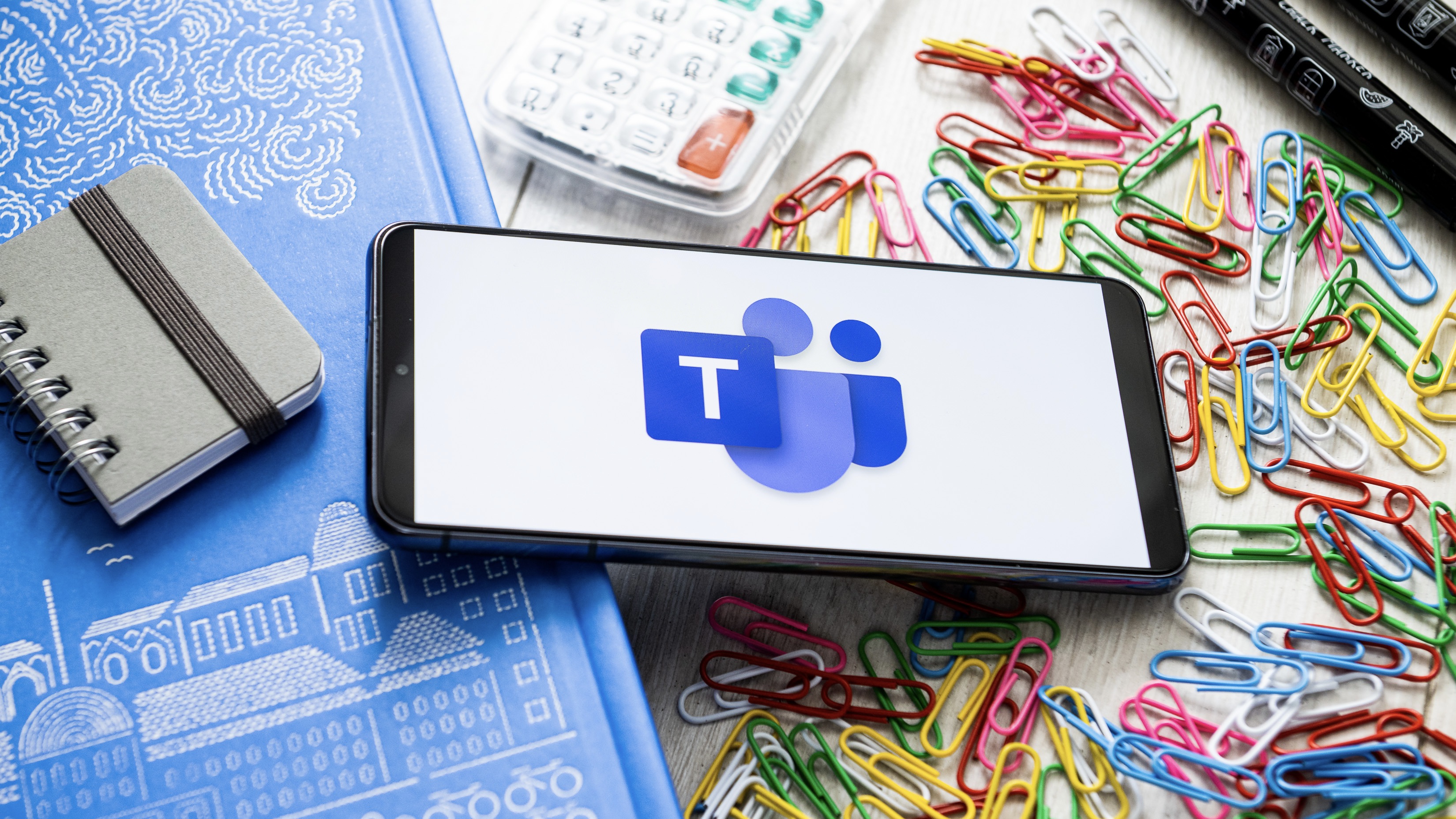 New Microsoft Teams features for business users
New Microsoft Teams features for business usersIn-depth All the latest Microsoft Teams features after the platform is given a redesign, complete with an AI-powered assistant and a faster engine
-
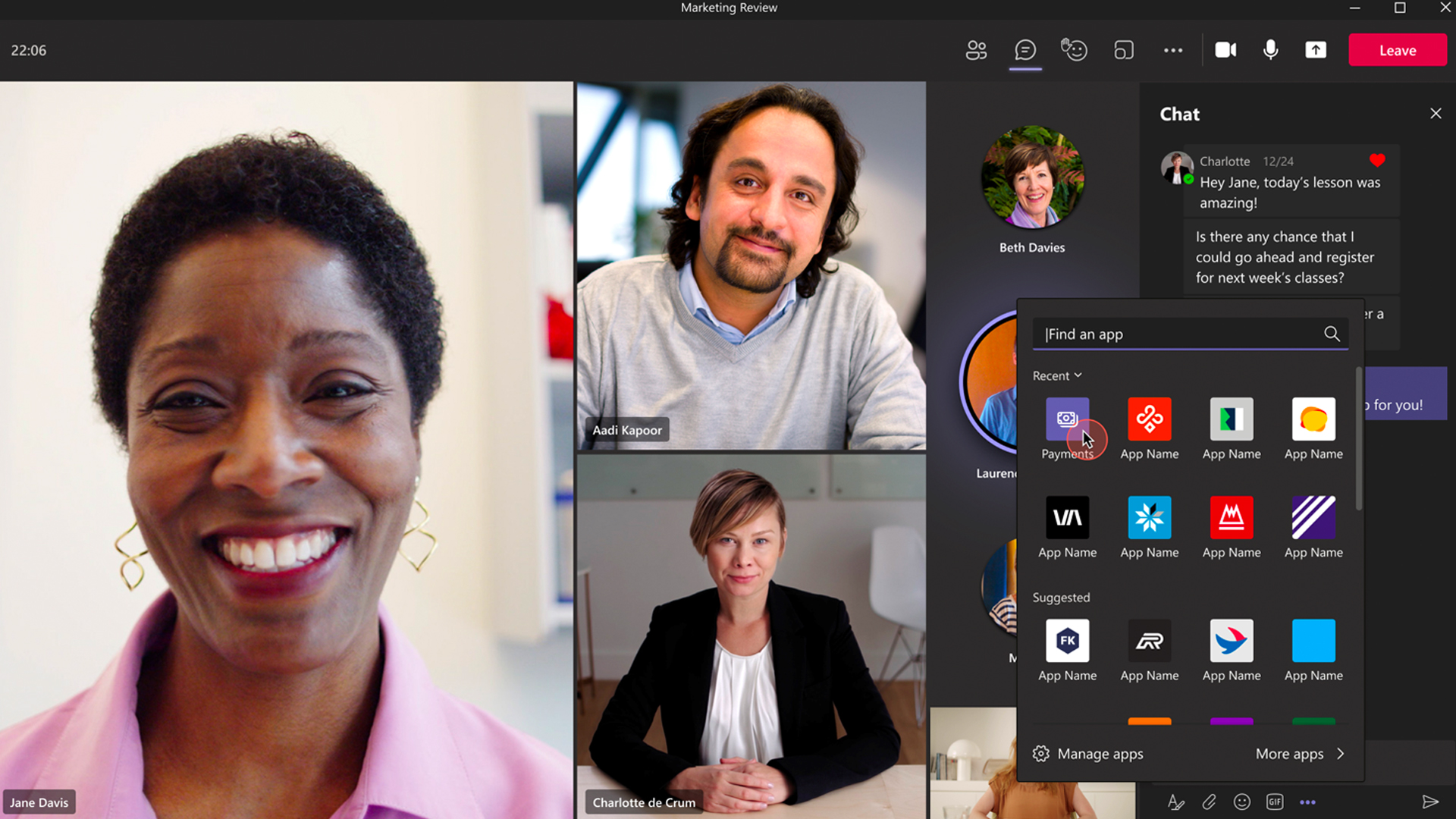 Microsoft Teams now allows SMBs to collect payments in meetings
Microsoft Teams now allows SMBs to collect payments in meetingsNews With the help of PayPal, Stripe, and GoDaddy, the Microsoft Teams Payments app offers in-meeting payment requests
-
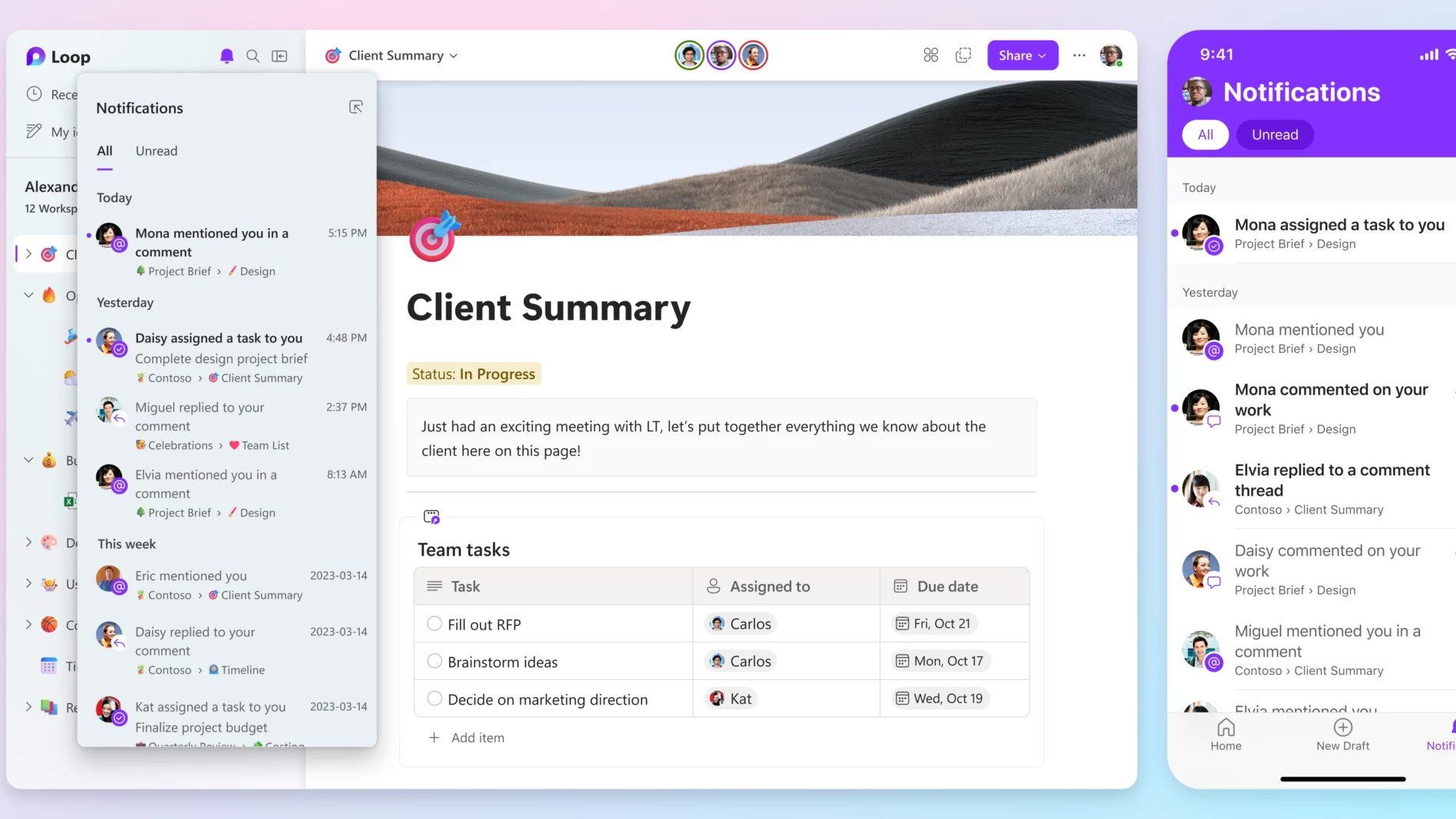 Microsoft launches collaboration platform Loop, its answer to Notion
Microsoft launches collaboration platform Loop, its answer to NotionNews Greater collaboration tools are coming to the Microsoft 365 suite, aiming to help teams work together without having to jump between different apps
-
 Meta Quest Pro preview: Meet Meta's 'laptop killer'
Meta Quest Pro preview: Meet Meta's 'laptop killer'Opinion We go hands-on with the Meta Quest Pro, as the firm banks on turning hardware preferences upside down
-
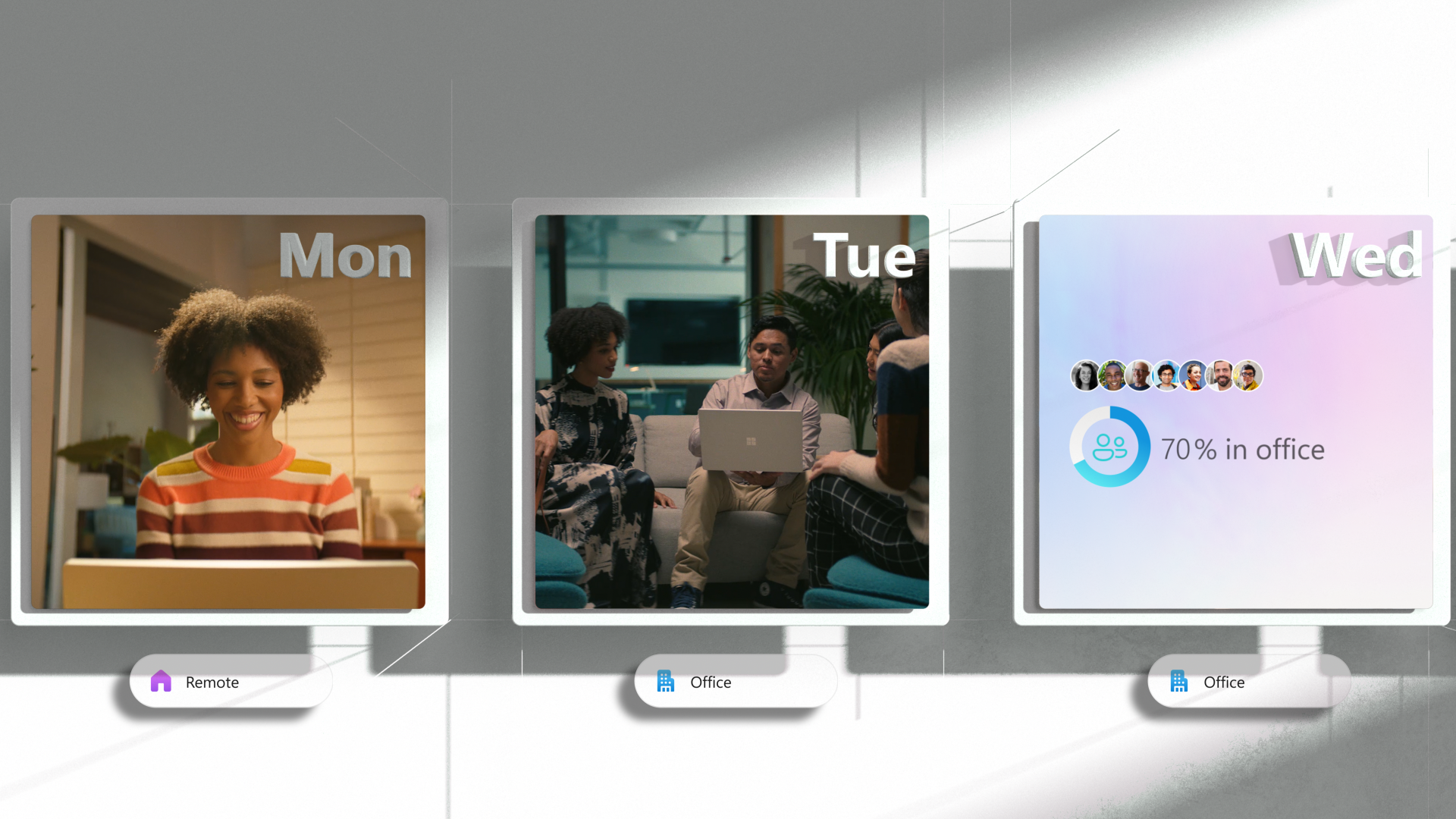 Microsoft launches Places, includes GPS-style navigation to help find meeting rooms
Microsoft launches Places, includes GPS-style navigation to help find meeting roomsNews The new app built specifically for organisations adopting a permanent hybrid work model brings new features to manage people and the workplace itself
-
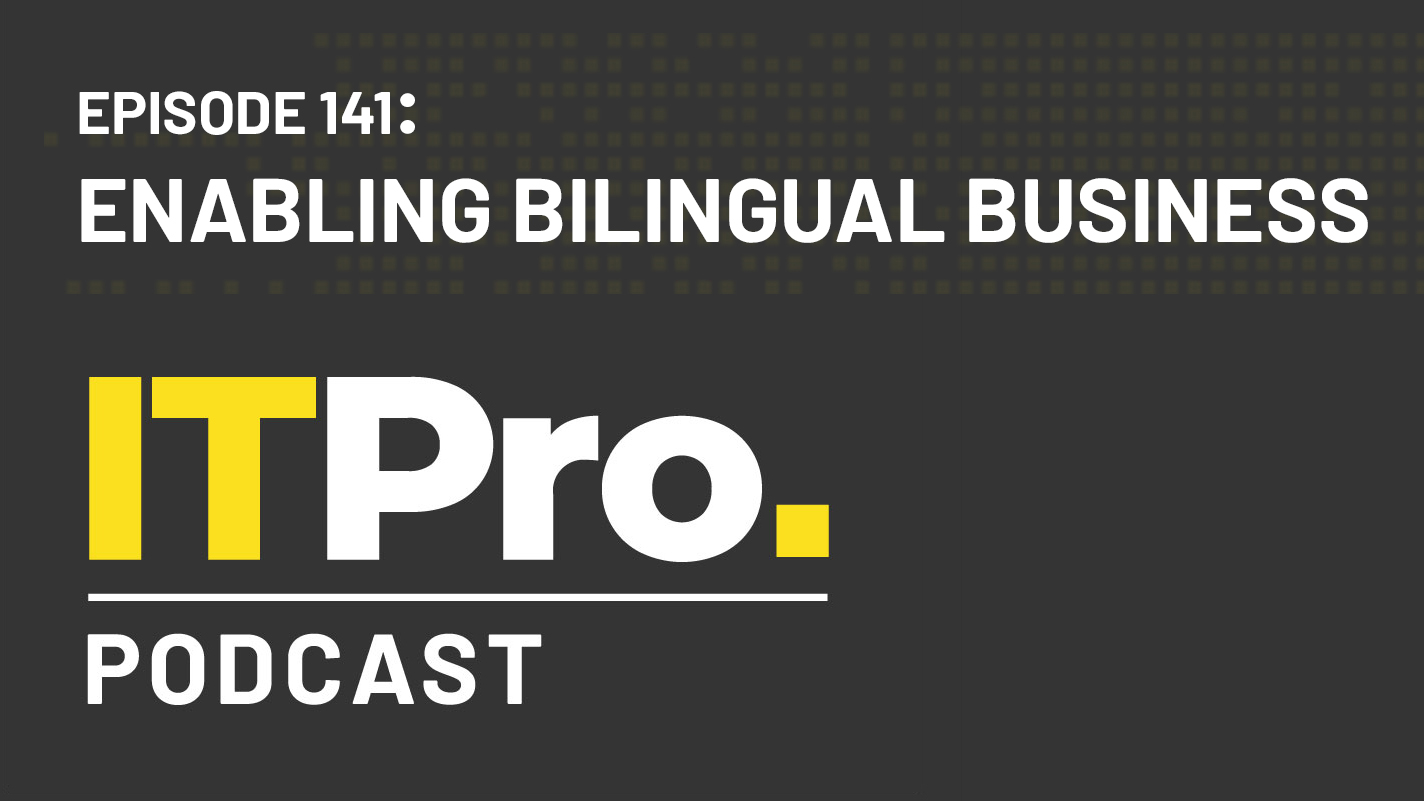 The IT Pro Podcast: Enabling bilingual business
The IT Pro Podcast: Enabling bilingual businessIT Pro Podcast How Wales is using digital tech to deliver a greater choice of languages
-

 Qnap KoiBox-100W review: An intriguing alternative
Qnap KoiBox-100W review: An intriguing alternativeReviews A versatile and affordable videoconferencing solution with great wireless screen presentation features
-
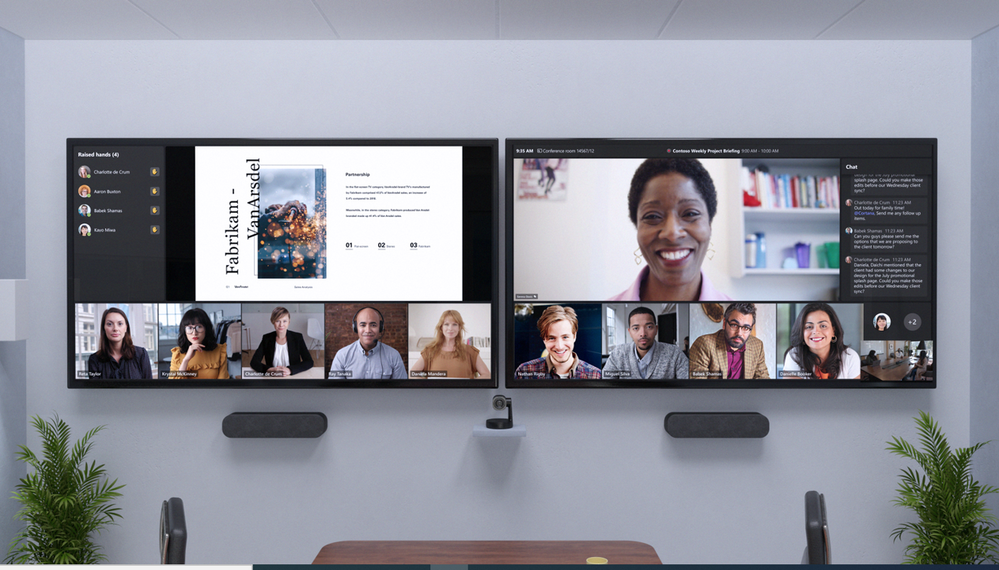 Microsoft reveals price decreases for Teams Rooms, new free tier
Microsoft reveals price decreases for Teams Rooms, new free tierNews Under the new plans, businesses with certified hardware can use the service at no extra cost



